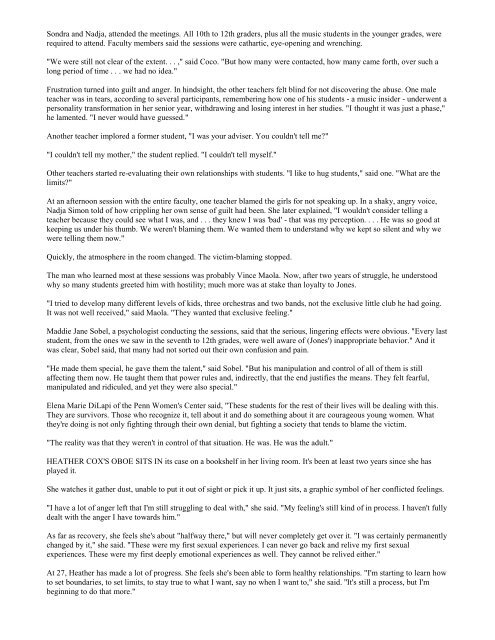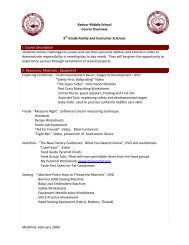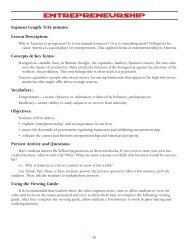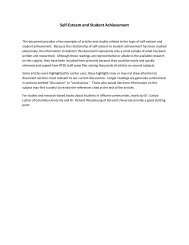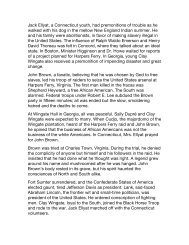WHEN THE MUSIC STOPPED - Radnor School District
WHEN THE MUSIC STOPPED - Radnor School District
WHEN THE MUSIC STOPPED - Radnor School District
- No tags were found...
You also want an ePaper? Increase the reach of your titles
YUMPU automatically turns print PDFs into web optimized ePapers that Google loves.
Sondra and Nadja, attended the meetings. All 10th to 12th graders, plus all the music students in the younger grades, wererequired to attend. Faculty members said the sessions were cathartic, eye-opening and wrenching."We were still not clear of the extent. . . ," said Coco. "But how many were contacted, how many came forth, over such along period of time . . . we had no idea."Frustration turned into guilt and anger. In hindsight, the other teachers felt blind for not discovering the abuse. One maleteacher was in tears, according to several participants, remembering how one of his students - a music insider - underwent apersonality transformation in her senior year, withdrawing and losing interest in her studies. "I thought it was just a phase,"he lamented. "I never would have guessed."Another teacher implored a former student, "I was your adviser. You couldn't tell me?""I couldn't tell my mother," the student replied. "I couldn't tell myself."Other teachers started re-evaluating their own relationships with students. ''I like to hug students," said one. "What are thelimits?"At an afternoon session with the entire faculty, one teacher blamed the girls for not speaking up. In a shaky, angry voice,Nadja Simon told of how crippling her own sense of guilt had been. She later explained, "I wouldn't consider telling ateacher because they could see what I was, and . . . they knew I was 'bad' - that was my perception. . . . He was so good atkeeping us under his thumb. We weren't blaming them. We wanted them to understand why we kept so silent and why wewere telling them now."Quickly, the atmosphere in the room changed. The victim-blaming stopped.The man who learned most at these sessions was probably Vince Maola. Now, after two years of struggle, he understoodwhy so many students greeted him with hostility; much more was at stake than loyalty to Jones."I tried to develop many different levels of kids, three orchestras and two bands, not the exclusive little club he had going.It was not well received," said Maola. "They wanted that exclusive feeling."Maddie Jane Sobel, a psychologist conducting the sessions, said that the serious, lingering effects were obvious. "Every laststudent, from the ones we saw in the seventh to 12th grades, were well aware of (Jones') inappropriate behavior." And itwas clear, Sobel said, that many had not sorted out their own confusion and pain."He made them special, he gave them the talent," said Sobel. "But his manipulation and control of all of them is stillaffecting them now. He taught them that power rules and, indirectly, that the end justifies the means. They felt fearful,manipulated and ridiculed, and yet they were also special."Elena Marie DiLapi of the Penn Women's Center said, "These students for the rest of their lives will be dealing with this.They are survivors. Those who recognize it, tell about it and do something about it are courageous young women. Whatthey're doing is not only fighting through their own denial, but fighting a society that tends to blame the victim."The reality was that they weren't in control of that situation. He was. He was the adult."HEA<strong>THE</strong>R COX'S OBOE SITS IN its case on a bookshelf in her living room. It's been at least two years since she hasplayed it.She watches it gather dust, unable to put it out of sight or pick it up. It just sits, a graphic symbol of her conflicted feelings."I have a lot of anger left that I'm still struggling to deal with," she said. "My feeling's still kind of in process. I haven't fullydealt with the anger I have towards him."As far as recovery, she feels she's about "halfway there," but will never completely get over it. "I was certainly permanentlychanged by it," she said. "These were my first sexual experiences. I can never go back and relive my first sexualexperiences. These were my first deeply emotional experiences as well. They cannot be relived either."At 27, Heather has made a lot of progress. She feels she's been able to form healthy relationships. "I'm starting to learn howto set boundaries, to set limits, to stay true to what I want, say no when I want to," she said. ''It's still a process, but I'mbeginning to do that more."


